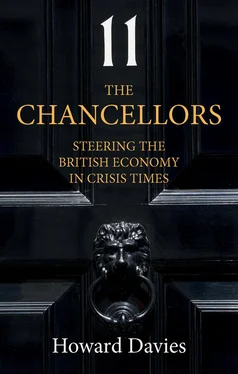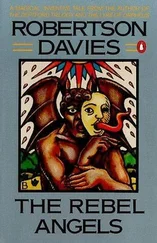227 253
228 254
229 255
230 256
231 257
232 258
The Chancellors
Steering the British Economy in Crisis Times
Howard Davies
polity
Copyright © Howard Davies 2022
The right of Howard Davies to be identified as Author of this Work has been asserted in accordance with the UK Copyright, Designs and Patents Act 1988.
First published in 2022 by Polity Press
Polity Press
65 Bridge Street
Cambridge CB2 1UR, UK
Polity Press
101 Station Landing
Suite 300
Medford, MA 02155, USA
All rights reserved. Except for the quotation of short passages for the purpose of criticism and review, no part of this publication may be reproduced, stored in a retrieval system or transmitted, in any form or by any means, electronic, mechanical, photocopying, recording or otherwise, without the prior permission of the publisher.
ISBN-13: 978-1-5095-4955-9
A catalogue record for this book is available from the British Library.
Library of Congress Control Number: 2021948546
The publisher has used its best endeavours to ensure that the URLs for external websites referred to in this book are correct and active at the time of going to press. However, the publisher has no responsibility for the websites and can make no guarantee that a site will remain live or that the content is or will remain appropriate.
Every effort has been made to trace all copyright holders, but if any have been overlooked the publisher will be pleased to include any necessary credits in any subsequent reprint or edition.
For further information on Polity, visit our website:
politybooks.com
AIFMDAlternative Investment Fund Management DirectiveB-DEMBespoke Dynamic Equivalence MechanismBEISDepartment for Business, Energy and Industrial StrategyCBIConfederation of British IndustryCCCCommittee on Climate ChangeCOPConference of the PartiesCPIConsumer Prices IndexCSTChief Secretary to the TreasuryDMODebt Management OfficeDTIDepartment of Trade and IndustryECBEuropean Central BankECJEuropean Court of JusticeEEAEuropean Economic AreaEMUEconomic and Monetary UnionERMExchange Rate MechanismESRCEconomic and Social Research CouncilESTEconomic Secretary to the TreasuryFCAFinancial Conduct AuthorityFCDOForeign, Commonwealth and Development OfficeFSAFinancial Services AuthorityFSRFinancial Stability ReviewFSTFinancial Secretary to the TreasuryGDPgross domestic productGFCglobal financial crisisGVAgross value addedHAMHigh Alignment ModelHMRCHer Majesty’s Revenue and CustomsICTinformation and communication technologiesIFSInstitute for Fiscal StudiesIMFInternational Monetary FundMOUMemorandum of UnderstandingMPCMonetary Policy CommitteeOBROffice for Budget ResponsibilityPFIprivate finance initiativePRAPrudential Regulation AuthorityPSAspublic service agreementsPSLprivate sector liquidityQEquantitative easingR&DResearch and DevelopmentRBSRoyal Bank of ScotlandRPIRetail Prices IndexSECSecurities and Exchange CommissionSIBSecurities and Investments BoardSMEsmall and medium-sized enterpriseSNPScottish National PartyTSCTreasury Select CommitteeWTOWorld Trade Organisation
In 2006, I edited and introduced The Chancellors’ Tales . 1It included lectures given at the London School of Economics by the five former Chancellors of the Exchequer then alive: Denis Healey, Geoffrey Howe, Nigel Lawson, Norman Lamont and Kenneth Clarke (I excluded John Major who had served for a short period). Their brief was to reflect on the challenges of running the Treasury.
The period covered ran from 1974 to 1997. Aside from the personal availability, there was a certain policy logic in that it began with Healey’s attempt to establish budget discipline and control inflation, after the International Monetary Fund (IMF) visitation in 1976. Healey introduced the monetary framework which Howe made the centre of his policy. The period ended with the 1997 election, immediately after which Brown handed control of interest rates to an independent Bank of England.
Since 1997, five more Chancellors have passed through the Treasury, with a sixth (as I write) now in office. So it seemed timely to assemble their reflections on the role. But, partly because the Covid pandemic ruled out another series of lectures, I have adopted a different technique. Gordon Brown, Alistair Darling, George Osborne and Philip Hammond, who cover the period from 1997 to 2019, were kind enough to agree to be interviewed. I am very grateful to them, and to the senior officials, special advisers and ministers who also agreed to answer my questions. Where they were happy to be quoted, they are identified in the text and the notes. I have taken the story up to late 2021, though without the benefit of oral evidence from Sajid Javid or Rishi Sunak.
Three pieces of conventional wisdom are often recycled by the Treasury’s critics. First, that by international standards it is far more powerful than its counterparts: in most other major developed countries there is typically an economic ministry alongside the finance ministry, and there is often a stronger central policy function around the President or Prime Minister. Second, that the Treasury’s ‘dead hand’, masquerading as public expenditure control, constrains government policy unreasonably and damages investment and innovation. Third, that after a series of missteps, the Treasury’s authority is not what it was, and it is riding for a fall.
There may be some truth in the first argument, though a little less since Bank of England independence and the creation of the Office for Budget Responsibility (OBR). But it is not obvious that a single ministry of finance and economy delivers worse policy outcomes. There were several attempts during this period to cut the Treasury down to size, usually driven by the Prime Minister’s staff. In a political system where a Prime Minister with a large majority in Parliament has a remarkable degree of power, the existence of a strong alternative centre is a valuable check on ‘elective dictatorship’.
The second, the ‘dead hand’ argument, includes two subvariants, one micro, one macro. The micro case is that the Treasury is ‘the bank that likes to say no’, always sceptical about new ideas unless they are generated by its own people, and especially suspicious of local initiatives. As one former Permanent Secretary acknowledged, officials are far readier to explain why new initiatives may not work than to generate new thoughts of their own. The Treasury defence is that if it does not train a sceptical eye on wizard ideas for spending other people’s money, no one else will, and that, in the long-running Whitehall drama, it is inevitably cast in the role of Scrooge. To mix Dickensian metaphors, Scrooge may not be popular, but where all the other characters are Oliver Twists with their bowls out asking for more, some with bowls already quite full, his spirit is required.
The macro critique is more serious and has gained force during the period under review. In a world where there is a chronic surplus of saving over investment, the Treasury has maintained a version of Mrs Thatcher’s household economics, urging successive Chancellors (though Osborne needed little urging) to work towards balancing the books, even when the economy was operating below capacity and real interest rates were very low or negative. So the charge is that UK recovery from the 2008/9 financial crisis was slower than it need have been, and that a similar mistake is in the course of being made as we exit from the pandemic. I review those arguments in Chapters 2and 3, and again at the end.
The third argument is that, partly because the Treasury has been on the wrong side of history on the second critique, its authority has declined within government and it is a shadow of its former self. Lionel Barber, former Financial Times editor, summarized the case in an article in Prospect magazine titled ‘The Treasury Today: A Devalued Currency?’. 2
Читать дальше









